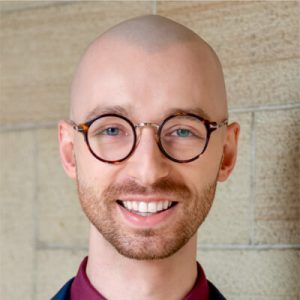Scientist Profile: Joel Le Forestier, Ph.D.
Assistant Professor, University of Pittsburgh Department of Psychology

Understanding Stigma and Identity
Stigma remains a significant barrier to people embracing their identities within their communities. As a highly social species, humans have evolved to navigate intergroup relationships for survival – securing food, shelter, and protection. This has led to adaptive strategies like concealing aspects of oneself that may be viewed unfavorably, especially within tight-knit social networks. In the context of LGBTQIA+ identities, this is often referred to as being “in the closet.”
Research Focus and Lab Leadership
Dr. Joel Le Forestier ![]() founded the Identity and Intergroup Relations Lab
founded the Identity and Intergroup Relations Lab ![]() at the University of Pittsburgh in 2025 to study the effects of identity concealment. His research explores how hiding one’s identity can negatively impact health and social connection. His work has been published in several prestigious journals and has garnered awards within the academic community.
at the University of Pittsburgh in 2025 to study the effects of identity concealment. His research explores how hiding one’s identity can negatively impact health and social connection. His work has been published in several prestigious journals and has garnered awards within the academic community.
But Dr. Le Forestier did not always plan to do research. During his undergraduate career, his primary focus was the intersection of social work and policy. While at the University of Waterloo in Ontario, he pursued internships and work in this area, but at one of his internships, he was presented with a challenge. His boss, assuming that he was a psychology student, assigned him to interpret the findings of a scientific paper. Although he had no experience interpreting scientific journal articles, he said, “I was too afraid to tell my boss no.” He then worked very hard to understand and explain the article’s findings and discovered that he was very interested in the work along the way.
This showed him that the things he was passionate about were fields of research and he could spend the rest of his career studying these interests. He read article after article by this same research group and eventually stumbled upon a paper that featured the work of a professor who just so happened to also be located at the University of Waterloo.
With no prior research experience, he cold-called this professor to let her know he was passionate about this field and wanted to work in her lab. After a series of interviews, he developed a project with this professor to study whether positive affirmations would affect negative body image. Although their findings did not demonstrate that positive affirmations improved body image, he did familiarize himself with the work and solidified his ambition for research.
However, this was a realization that Dr. Le Forestier made late in his schooling. Many people face this challenge later in their education where they discover they have an entirely new interest which does not follow the trajectory of their initially planned path. It is easy to become discouraged and assume that you are too late for something – that you have missed opportunities to pursue a certain field.
Understanding this sentiment all too well, Dr. Le Forestier said he would advise undergraduates to remember that college is for exploring, and you should explore broadly. If there is even an ounce of doubt as to what you might want to pursue, take the chance to expose yourself to as many different possibilities as you can. Although Dr. Le Forestier did not initially envision himself as a researcher, he discovered that this was something he loved doing and – following his bachelor’s degree – worked as a lab manager to gain the research experience that he had missed.
Graduate School and Mentorship
When he then went to graduate school, he was worried that this would put him behind – that all the other students would have started graduate school right after their undergraduate education concluded. But as with many people who go to graduate school, he discovered that there was a great range of backgrounds and ages and times at which people realized they, too, wanted to pursue research.
Dr. Le Forestier also discovered that his mentors gave him the freedom to ask questions and pursue studies that he was interested in. Therefore, the first projects he worked on were projects that he had dreamed up. While this meant that he sometimes pursued dead ends, he found that he was able to try and fail in a safe and supportive space. This led to many collaborations and eventually a year-long postdoc at Cornell, after which he moved to his current position at the University of Pittsburgh.
Within his new position, Dr. Le Forestier is discovering new challenges. As someone who studies diversity and inclusion, he has faced many concerns over the ability to continue pursuing this research. Additionally, as the Principal Investigator of his lab, he is now in a position of mentoring several different students who are each facing their own challenges, including threats to their own identities.
Timely Research on Public Health and Stigma
Dr. Le Forestier studied stigmatization, concealment, and health outcomes during the monkeypox outbreak of 2022 ![]() . Much of the public health messaging was targeted towards sexual minority men, and given LGBTQIA+ history, concerns rose about the association of sexuality with a disease. He found that some individuals did indeed begin to conceal more
. Much of the public health messaging was targeted towards sexual minority men, and given LGBTQIA+ history, concerns rose about the association of sexuality with a disease. He found that some individuals did indeed begin to conceal more ![]() during this time. Dr. Le Forestier is also considering the impact of recent laws and declarations concerning the freedom of many sexual and gender minority individuals.
during this time. Dr. Le Forestier is also considering the impact of recent laws and declarations concerning the freedom of many sexual and gender minority individuals.

With research indicating that concealing increases health risks, Dr. Le Forestier has emphasized that developing a safe environment where one does not feel compelled to conceal their identity is key in improving outcomes. Given that stigma is a leading factor contributing to individuals concealing, it is important to foster communities where all identities are affirmed and safeguarded.
